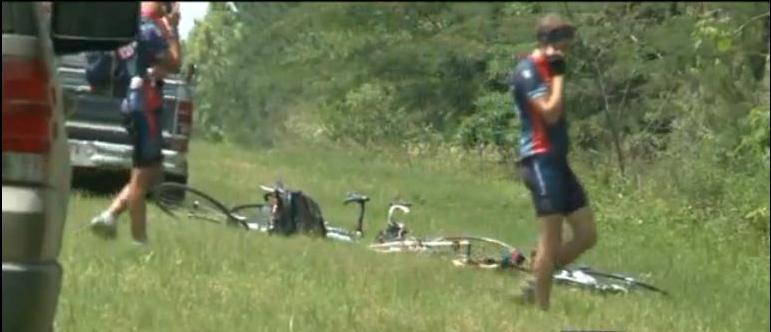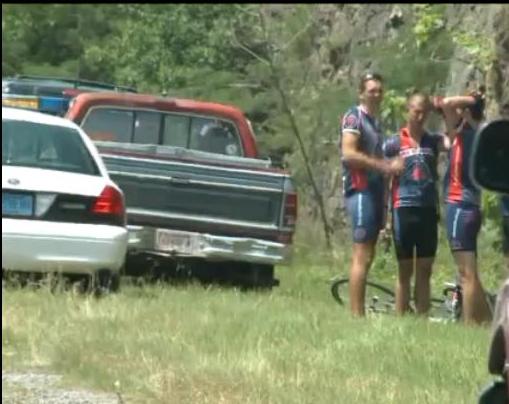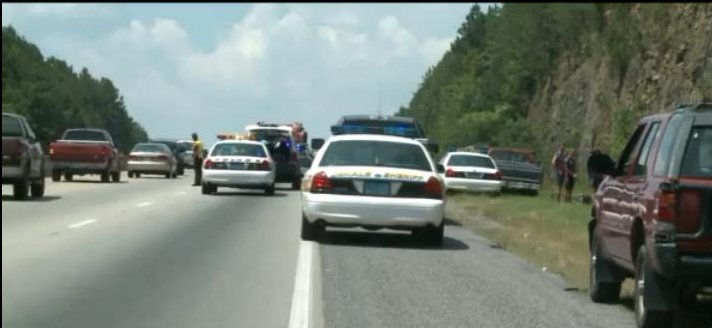Justice is an elusive concept, fraught with emotion, intuition and idealism. It exemplifies all that is good in humankind, while in the face of evil, it represents a longing for who we want to be.
Within the context of a less than perfect world, each of us lives a life filled with trials and tribulations. Such a life cannot always be measured by minutes, hours and days; it is the sum total of a spirit who existed independently of space and time.
Nine months ago, in June of the year 2011, the life of a young cyclist, Christina Genco, was extinguished prematurely by a brush with fate. At the time of her death, she was with a group of cyclists who were riding across the country as part of a national campaign called Bike and Build. Their goal was to raise money for Habitat for Humanity and to help build affordable housing. I wrote about her misfortune on this blog because she represented the countless cyclists who lose their lives to negligent drivers on American roads.
As a young person, on the brink of adulthood, she hadn’t had a chance to make a name for herself. But, according to interviews of her friends and family, which appeared in articles in several states, she had touched the lives of many people with whom she had contact.
Small deeds, such as participating in a long-distance bike ride designed to facilitate the building of affordable housing, often go unnoticed. And, for this reason, I was not optimistic that she would receive the justice owed her.
For months I followed her case. After the initial reports, there was little in the way of news from Alabama, where Christina lost her life. Only a brief report that the investigation had ended was made public, and a hint that it would go to a grand jury to determine whether the driver, Craig Chandler, would face charges.
To keep the story alive, I attempted to contact members of the media, and a few Alabama authorities, to find out the status of this case. No one replied to me. Nonetheless, due to the constant traffic on my blog post, I heard from Alabama residents who were just as upset about what had happened to Christina as we were, here in Massachusetts. So, I knew that some people in Alabama cared. And, as a blogger, I watched my words influencing the way people thought about this situation.
Nearly a year after the accident, one or two news sites reported on the conclusion of the investigation. They told us that the grand jury had indicted Craig Chandler for Criminally Negligent Homicide, a misdemeanor. If convicted, he could face up to a year in jail and a $6,000 fine.
I had mixed feelings about this outcome. On one hand, Chandler was facing charges, unlike the many drivers who get off scot free after killing cyclists. On the other hand, the penalty was ridiculously small for taking a human life.
As much as I wanted to write about this story, I decided to go out for a bike ride to crystallize my thoughts. Despite the unusual hour, well past midnight, I put on my helmet and headed outdoors. Under the glow of street lights, I decided to ride through Newton, Massachusetts, Christina’s hometown.
Once my trip was underway, I rode past a place where I remembered seeing Christina. I flew by it just as the Bike and Build riders must have ridden past scenery along their cross-country route. Turning onto a side street, I headed towards the center of Newton.
Suddenly, something broke the silence, and drowned out the whirring drivetrain of my freshly cleaned and lubed bike. Looking in the direction of the noise, I noticed something moving alongside the road. To my complete and utter dismay, it was a runner.
I had never seen anyone outdoors at that hour. As I got closer, the shadowy figure turned into a young man. He must be a student, I thought, since he was running towards Boston College. I steered my bike into the center of the road and eased up on my pedaling, so as not to startle him.
He barely looked up as I passed, but I imagined that he was as surprised to see me as I was to see him. I took this sighting as an omen. Not long after, I turned onto Beacon Street, with the goal of riding all the way across Newton.
I had the barren road to myself. Yet, I decided to ride smack down the middle of the five-month-old bike lane, which had been installed to make Newton more bicycle friendly. I recalled the night, in October 2011, when I had passed through Newton Centre, only to encounter screaming white lines painted on the road.
It took me a minute to figure out what they were. Once I spotted a bicycle painted on the road, I realized that the lines were there for me, and I positioned my bike accordingly. As I rode up the hill in the newly-minted bike lane, I spotted a crew of workers painting lines on the other side of the street. They looked up when they saw me.
One called out to ask how I liked the new bike lanes. I shouted back my approval in a tone of voice which conveyed a gleeful smile through the darkness, and I rode on.
Another bicycling memory came to mind as I sailed down a deep descent, while glancing at the spot near the post office, where a bicycle safety sign had been placed last summer. It was a rotating, flashing safety sign which inspired my post, Bicycles Are Everywhere, named after the message on the sign. Even though the post was written in jest, I really liked that sign because it grabbed drivers’ attention and imprinted an indelible bicycle safety message in their minds.
Once back in the present, I rode lost in thought, not a car in sight, and my trip was uneventful. The air was warming through the night as I pulled into my driveway and proceeded to my destination.
Finally seated at my computer, I stared at a photo of Craig Chandler. He looked calm, with a half-smile below his shaded eyes, and I wondered how he could not have seen Christina riding along the road — which is what he told the investigators, who concluded that there were no allegations of intoxication or impairment, and nothing relating to speed.
I reread a few articles about the accident and began to wonder how this conclusion had come to be. After the investigation, I pondered, a grand jury had heard the evidence against Chandler. Although we can’t know for sure what they considered, we can always speculate.
According to an Alabama cyclist and bicycle shop owner, Darren Haramija:
“Many Alabama drivers are unaware or do not acknowledge that cyclists are allowed to be on the same road. Alabama still remains one of the states that doesn’t have a three foot passing law on the books. Hopefully the legislators will take note and give this an opportunity for them to make some needed improvements, helping to take care of cyclists.”
In Alabama, there is still prejudice against cyclists, and there are weak laws on the books, which can’t ensure their protection. This may have worked in Chandler’s favor, since the grand jury was made up of his peers.
Fortunately, the Marshall County district attorney will prosecute the case, because Chandler is a former investigator for the DeKalb County District Attorney’s Office. The DA said that the grand jury considered several possible charges, including manslaughter and vehicular homicide, before reaching the Criminally Negligent Homicide indictment. They arrived at this charge because the murder was unintentional, but due to gross negligence, there was approximate cause of an individual’s death.
Since there is no three foot passing law in Alabama, requiring a motorist to allow that amount of distance when passing a bicycle, they will use a different motor vehicle law against Chandler. “The driver of a vehicle overtaking another vehicle proceeding in the same direction shall pass to the left thereof at a safe distance and shall not again drive to the right side of the roadway until safely clear of the overtaken vehicle.” (Code of Alabama Section 32-5A-82)
Essentially, the gist of the prosecutor’s case rests upon the notion that Chandler failed to exercise the appropriate rules of the road when passing a vehicle, which in this case was a bicycle. Therefore, he is being charged with a moving violation, not with the murder of a cyclist.
This situation represents a bittersweet victory for cyclists. It shows how weak the laws are for protecting cyclists. It shows how prejudice against cyclists can work in favor of motorists. And, it shows how knowing the right people can sway a grand jury into believing that you simply failed to see a cyclist — who was riding among a large group of cyclists — and had neither ill-will towards nor impatience with cyclists who were sharing a road some drivers see as belonging to cars.
We’ll never know what was going through Chandler’s mind when he struck Christina from behind with his SUV. But, maybe the jury in his trial will give him a year to think about what happened, by putting him behind bars — even if it is no more than a mere gesture.
On the bright side, the prosecutors are planning to focus on the rights of cyclists on the road, as well as the responsibilities of motorists. And, cyclist Darren Haramija managed to get several Share the Road signs posted around Guntersville, Alabama. He is hoping to raise driver awareness to reduce the number of car-bicycle accidents.
To help clarify the facts, WHNT News 19 in Huntsville, Alabama posted a couple of good news videos about the indictment. Due to technical limitations, I cannot embed the videos on this blog, but below are a few preview shots from the accident scene.



While this outcome may be little more than a hint of justice, it is a start. Christina wanted to help people and to make a difference. In addition to influencing the lives of people in need, and her friends across the country, Christina educated people in two states: Alabama and Massachusetts. The former will attempt to deliver justice in her wrongful death. They may also try to strengthen their laws to protect cyclists, and try to lay the legal groundwork necessary for holding negligent drivers accountable in the future.
The latter, Massachusetts, will be the home of a new foundation, created by Christina’s family, to continue her legacy. The goal of the Christina Clarke Genco Foundation (CCGFoundation.org) is: “To inspire youth to find their passion and make a difference in their communities… There are three primary focuses of the foundation: bicycling safety education, athletic scholarships, and support for affordable housing.”
If nothing else, and in the absence of true justice, we can take away from this sad situation the knowledge that one person can make a difference. One person can change attitudes. One person can change lives. One person can change laws. Each of us can make a difference. And, even in the face of tragedy, we must never forget the power of an individual life.



